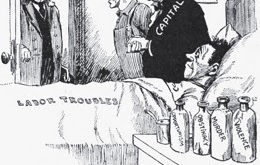from Lars Syll We all heterodox economists who have chosen the road ‘less traveled by’ know that this choice comes at a price. Fewer opportunities to secure ample research funding or positions at prestigious institutes or universities. Nevertheless, yours truly believes that very few of us regret our choices. One doesn’t bargain with one’s conscience. No amount of money or prestige in the world can replace the feeling of looking in the mirror and liking what one sees. My friend Axel...
Read More »Paul Davidson (1930-2024)
Paul (I'm next to him) and the Brazilians at the UMKC, PK Conference in 2002Paul has passed away a few days ago. He wasn't in good shape for a while, and this was expected. He lived a long and productive life. I wasn't personally close to him, even though I met him several times from the mid-1990s onward. He went to two conferences I co-organized at the Federal University in Rio, always with Louise, which was a central figure of Post Keynesian (PK) life, and basically run the Journal of Post...
Read More »Keynes’ denial of conflict: a reply to Professor Heise’s critique
Tom Palley reply to response about his paper on Keynes lack of understanding of class conflict. In many ways, this is how Tom discusses Keynes lack of understanding of old classical political economy. Tom is correct in pointing out that:"Kalecki (1933 [1971]) began the process of incorporating conflict into the Keynesian paradigm, but there is much more to be done regarding recognizing conflicts’ implications for economic theory and recognizing the multiple fora in which it appears."Of...
Read More »Was Keynes a Liberal or a Socialist?
A Socialist Rag My old Will Lyons Lecture at Franklin & Marshall College in the Spring of 2021 is now a working paper. Prof. Lyons was a Bucknell Graduate, and a professor at F&M. The topic was based on the, at that time, recent reading of Jim Crotty's book. From the abstract:Right-wing critics of Keynes have often suggested that he was a socialist. His policy proposals were very often described as a slippery slope that would lead society into a totalitarian nightmare....
Read More »The problem with Keynes’ General Theory: by Tom Palley
New working paper by Tom Palley. From the abstract:Keynes' General Theory was a massive step forward relative to classical economics, but it was also a step backward in its denial of the conflictual nature of capitalism. There is need to understand Keynes' technical contributions regarding the workings of monetary economies, but also need to understand the flaws within his thinking and the consequences thereof. Keynes made a fundamental contribution elucidating the mechanism of effective...
Read More »Review of Crotty’s “Keynes Against Capitalism” (forthcoming in ROKE)
It should not be a surprise that John Maynard Keynes is often seen as being relatively conservative by many progressively inclined or radical economists, that often tend to prefer the views of Michal Kalecki, or the more radical approach of Keynes’ favorite disciple, Joan Robinson. That is not the case in James Crotty’s book Keynes Against Capitalism, who takes a diametrically opposite view. He tells us that: “It is almost universally believed that Keynes wrote his magnum opus, The General...
Read More »Kalecki’s alternative to Keynes and White and its consequences
[embedded content] Partial video (my fault) of the conference about the book edited by the late Jerzy Osiatynski and by Jan Toporowski published by Oxford University Press. Our chapter on Prebisch with Esteban Pérez is available in a preliminary version here.
Read More »Beyond vulgar heterodox economics: a note on the legacy of Pierangelo Garegnani (1930-2011)
My paper, in Italian, which was a modified version of a talk last year, has been published in Moneta e Credito, and is available for download here.
Read More »The Price of Peace by Zachary D. Carter
Each era gets its own version of Keynes. The post-war era got the sanitized biography by his disciple and friend Roy Harrod. It emphasized the somewhat late Victorian values of what he called the presuppositions of Harvey Road, Keynes’ birth place at Cambridge, representing the ethical principles that he received from his parents. Not only it avoided any discussion of Keynes' sexuality, that was verboten at that time, and not just because Keynes’ mother was still alive, but also it was well...
Read More »Laissez-faire policies, self-adjusting market system, and neoliberalism
Classical political economics was in part a discourse for the rising bourgeoisie, and as such most of its members – that accepted some version of the labor theory of value and that distribution was conflictive – were for laissez-faire policies. That was certainly the case of the Physiocrats, and of Adam Smith and David Ricardo, the two most accomplished of the British political economists.However, the classical analytical scheme did not assume full employment of labor or that the economic...
Read More » Heterodox
Heterodox







